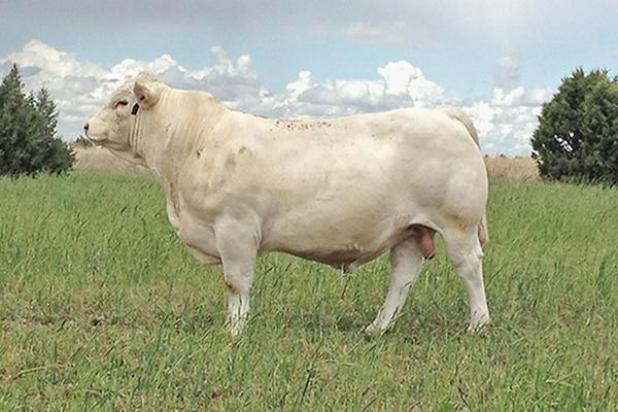
Creekside Charolais, owned by Ken Ham and wife of Holyoke, Colorado, has a bull sale once a year by private treaty sales. Here is one of the bulls from their operation.
Beef producers vs. pandemic disruptions generate mix of factors
Nebraska historically has been known as the Beef State, and May is Beef Month.
Beef production is foundational to the agricultural economy of Nebraska, so celebrating the impact of the beef community is an important acknowledgment.
The cattle business is regarded as essential and sales continue, although under different circumstances.
As COVID-19 has made its way across rural Nebraska, that kind of mingling seems increasingly risky to some, according to NET News.
Jara Settles of the Livestock Marketing Association said, “It’s a delicate balancing act. But I think it’s our moral and ethical obligation to keep agriculture open and to keep people fed.
“A country that can’t feed itself can’t defend itself,” she said.
Cattle auctions
The COVID-19 pandemic has affected nearly all aspects of life and business.
One area of the beef industry is centered around live sales that suppliers often cross state lines to attend.
Auction markets are an important part of the livestock industry, providing an essential service to folks who produce beef and other livestock, as noted in The Fence Post.
After speaking with cattle auction representatives across the state about how they are implementing social distancing and online business, Settles has found that some have cancelled events or held them remotely, while others are trying to implement crowd control.
Auctioneers see firsthand the effects of the pandemic. Their business thrives on large crowds, which is the exact opposite of current government regulations.
While the live auction attendance has been reduced nearly to zero, the National Auctioneers Association published a report stating online auctions have seen less of an effect on business.
The situation has pushed more auctions to be online as a way to stay in business, the report said.
David Whitaker, co-owner and auctioneer for Whitaker Marketing Group Auctions in Iowa, said he estimated about 30% of auctioneers already utilize online auctions.
Whitaker said many auctioneers were leery to go to a 100% online auction format because, in many instances, buyers were older and less inclined to want to bid online.
Plus, many people like the social aspect of attending auctions, he said.
Imperial Auction Market has been observing the federal COVID-19 CDC regulations and making it work.
“Most of our consignors are from this area, and they understand why we have to follow protocol,” said Marissa Smith, co-owner and office manager.
Neither the public nor consignors can come into the office or arena area during the Tuesday, bi-monthly auctions.
Consignors must unload their cattle and wait outside during the auction, or go home to watch online at www.CattleUSA.com and wait for a check in the mail, she explained.
“We’ve always broadcasted sales online, and we probably have a few more watching online now than before. But it’s hard to buy cattle online,” she said.
“But even so, our buyer base has stayed the same,” she added.
The buyer base is mostly made up of buyers from other states.
Buyers can come into the office in limited numbers for business transactions only, Marissa said.
Preston Smith, co-owner and auctioneer for Imperial Auction Market, said the auctions are affected by the low numbers of people in attendance.
“We are limited to only 10 buyers at a time when we were used to at least 15-20 buyers,” Smith said.
“Online sales help, but it’s not the same as being there,” he added.
Read the full story and many others FREE in the 2020 Salute to Beef special section.
